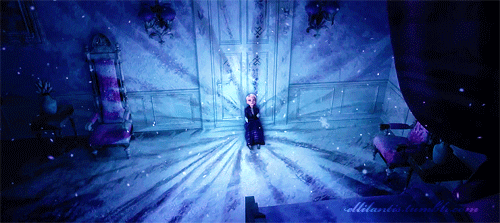I have been thinking about writing this blog for a long, long time, but after reading a recent article about two Hollywood celebrities deciding to boycott certain Disney movies because of their "questionable" content, I thought now would be a good time to finally get to work on it. (It also helps that I'm at home sick and have plenty of time to focus on this, haha).
Growing up, my sisters and I watched a lot of Disney movies (let's be honest, I still watch a lot of Disney movies), but as a child they were often little more than entertaining stories, which my sisters and I enjoyed re-enacting during our playtime. As I got older, I began to hear the adults around me - especially the women - criticizing Disney's portrayal of women, which they saw as belittling and anti-feminist. The first time I remember hearing such a criticism I was about 12 years old, and I inwardly balked at the comment, annoyed that someone was speaking ill of one of my favorite female Disney characters.
 |
| It was this unnamed girl from the Jungle Book, haha |
Snow White has long been one of my favorite Disney movies, but it seems to be one of the most controversial these days as concerns about sexual consent rise to the forefront (and understandably so). While I have no problem with parents taking the opportunity to explain the importance of consent while reading or watching Snow White with their children, I do think there is something deeper at the root of modern objections to Disney movies.
In short, we have lost our Christian Worldview, and with it, we have lost our understanding of the fundamental meaning of many fairy tales.
One common argument I hear regards the age of the princesses, and the length of time from meeting their prince to marriage. Oddly, I hear this argument more about Disney princesses than about Romeo and Juliet (although I find myself perhaps more amused and "bothered" - for lack of a better word - by the latter). This assessment often ignores the historicity of these stories, which were written in previous centuries when it was not uncommon for women to marry at a young age, and often after only a short courtship.
Historicity aside, the main problem I have with modern objections to Disney films is the lack of understanding of the underlying Christian themes.
It is precisely these Christian themes that make Snow White one of my favorite Disney films. In terms of overall production and story, it would probably not be my favorite. As Disney's first feature film created in the style of the age, it is perhaps not as compelling as some of the more modern Disney films. But looking deeper at the message behind the story at face value, it is one of the most beautiful parables of the Christian Story.
 |
| The Evil Queen jealously looking down on Snow White and her Prince |
In the beginning of the film, Snow White sings into a Wishing Well, longing for "the one I love to find me." In the Christian ethos, Christ is the One we love, the Good Shepherd who seeks us out as His lost sheep - those who seek Christ share the desire of Snow White for "the One they love to find them." In this sense, the Prince represents Christ - an important concept to keep in mind for the rest of the story.
The song that the Prince sings to Snow White when he does find her is a beautiful expression of Christ's unique love for each soul. Although Christ loves every soul, He loves each one with a love that seems only for her/him.
 Imagine Christ saying to you the words that the Prince sings:
Imagine Christ saying to you the words that the Prince sings:"One Song - I have but one song; One song, only for you
One heart, tenderly beating - Ever entreating, constant and true
One love that has possessed me; one love thrilling me through
One song, my heart keeps singing; of one love, only for you"
Isn't is true that God's love is singular, and that Christ's "one song" of love was sung from the Cross? His "one heart," the Sacred Heart, is "constant and true" and always "entreating" us, longing for our love in return. Because God is love, this one love "has possessed" Him, and is eternal ("my heart keeps singing of one love only for you").
Be still my heart! Sigh...
I could bask in this meditation of Christ's love forever, but I'll continue...
In a sense, Snow White also represents humanity before the Fall. She is virtuous - full of love and kindness, and lives in friendly communion with God's creatures (the woodland animals). Therefore, the evil Queen seeking her out with the poison apple is akin to the devil tempting Adam and Eve to eat the forbidden fruit.
This imagery shows us that when we give into the lies and trickery of the devil - no matter how tempting it may seem (I mean, who wouldn't want a magic wishing apple?) - we bring death upon ourselves - "the wages of sin is death" (Romans 6:23).
Thus, Snow White falls into a death-like sleep, representative of the soul in mortal sin. Since the Prince represents Christ, he is naturally the only one who can save her - literally causing her resurrection by his act of love (in this case, true love's kiss).
And what is the highest act of True Love but Christ's sacrifice on the Cross?
So, while at face value some may see Snow White as a sexist story about a weak, helpless woman who can only be rescued by a Prince who doesn't even respect her right to consent, underneath our modern grumblings is a truly beautiful representation of the story of Salvation.
Perhaps my favorite part of the film comes at the very end. The Prince puts Snow White on his white horse, and leads her away towards his kingdom...
If you look closely, his kingdom is literally a shining, golden kingdom in the sky!! What?!! How much more obvious a symbol of Heaven could there be?!
So, the next time you watch a classic Disney movie (especially those based on classic fairy tales), I encourage you to look for the Christian themes. I don't mean to claim that every Disney movie ever made will have this, but many of them have at least hints of it. Snow White is simply my favorite because I think it is the most obvious and beautiful re-telling of the Greatest Love Story ever told - that of God's love for us.
Happy viewing, and God bless you all!




















